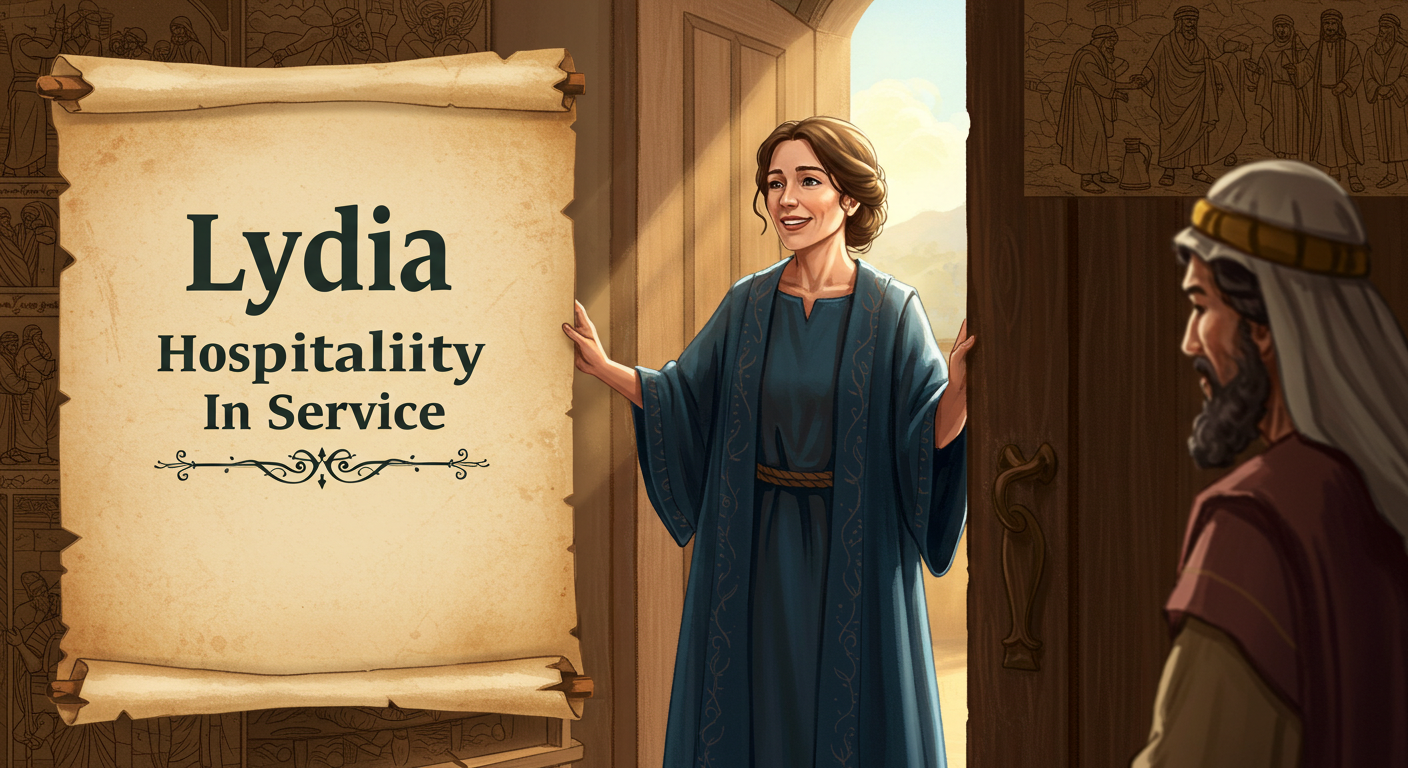Discover how Lydia’s story in Acts 16:14-15 reveals timeless lessons of faith, service, and hospitality. Explore the power of generosity in today’s world.
Lydia: Hospitality in Service – Acts 16:14-15
Have you ever met someone whose generosity just leaves you in awe? Someone who opens their doors, their hearts, and redefines the boundaries of kindness? In the bustling first-century city of Philippi, there was a woman named Lydia, and she did precisely that. Her story, though tiny in terms of biblical length, reverberates with the mighty echoes of service and hospitality. It’s a timeless tale found in Acts 16:14-15.

Introduction
Imagine the scene: a city filled with the commerce of the known world, where merchants gather and ideas flow as freely as goods. Here, amidst the clamor of market life and the silence of riverside prayer meetings, emerges the figure of Lydia—a dealer in purple cloth, a woman of status and substance. Despite being briefly mentioned in the biblical narrative, Lydia’s role is significant, her heart an open door not only to divine love but to the needs of others. She’s a testament to what it means to weave faith seamlessly into the fabric of everyday life, revealing to us a blueprint of coordinated compassion and service deeply ingrained in one’s spiritual identity.
Their Story in the Bible
Lydia’s story unfolds against the backdrop of Paul and his companions’ missionary journey. As they travel through Phrygia and Galatia, the Spirit of Jesus guides them to the region of Macedonia. Arriving in Philippi, they seek out a place of prayer beside the river. There, they encounter Lydia, a woman originally from Thyatira, engaged in the trade of purple cloth—a luxury commodity esteemed in the ancient world.
What makes Lydia noteworthy is not merely her trade or her wealth, but her openness to the gospel. As she listens to Paul preach, the Lord opens her heart, and she embraces the message with a fervent faith. This transformative moment compels her to act: she and her household are baptized, marking the beginning of a new chapter in their lives (Acts 16:14-15). Lydia doesn’t stop at just personal conversion; she extends hospitality to Paul and his companions, insisting they stay at her home. Her welcoming of these missionaries and her decisive faith are catalysts for the burgeoning Christian community in Philippi.
Lessons from Their Life
Lydia’s life offers us profound lessons, not just in faith, but in how faith operates through action and hospitality.
- A Receptive Heart: Lydia teaches the importance of having an open heart to divine encounters. Her willingness to listen and be transformed by the message brought by Paul demonstrates how being receptive can alter the course of one’s life. For us today, it emphasizes the necessity of attentiveness to opportunities for spiritual growth.
- Faith in Action: Lydia’s story underlines how genuine faith propels individuals into action. Her immediate response to being baptized was to offer hospitality to Paul and his companions. Her service was an act of faith—a reflection of her transformed heart. This teaches us that true faith extends beyond personal belief and enters into service and welcoming of others.
- Hospitality as Ministry: Perhaps one of the most significant lessons is the ministry of hospitality. Lydia didn’t just accept teaching; she supported the teachers. Her home became a hub for the early church—a sanctuary where believers could gather and be nourished both physically and spiritually. It challenges us to think about how we can use our resources and spaces to foster community and support others.
Connection to Today’s World
In today’s world, where division and isolation often seem to prevail, Lydia’s story is a potent reminder of the power of hospitality. Imagine transforming contemporary spaces into warm welcoming havens, not just with open doors but open hearts. Whether it’s that neighbor who needs a meal or a friend requiring a listening ear, Lydia’s example urges us to view hospitality as a mission field—a way to manifest love and acceptance tangibly.
Lydia’s choice to use her position and resources to support others challenges modern-day prejudices and social barriers. In an age where material wealth can often create divides, her story encourages integration and selfless service. It propels us to extend kindness and generosity beyond boundaries, fostering communities where genuine support flows freely amidst diverse individuals.
Key Bible Verse
“The Lord opened her heart to respond to Paul’s message.” (Acts 16:14)
This verse captures the essence of Lydia’s transformative experience. It speaks of divine initiation and human response—a harmony between grace and openness. Lydia’s receptive heart became the foundation upon which faith and action were built. It is a compelling reminder for us to remain open to divine nudges and transformation.
Thought-Provoking Question
Do you find yourself open to the spiritual opportunities around you, as Lydia was? How can you transform that openness into acts of generous service and hospitality today?
Historical/Cultural Context
Understanding Lydia’s story also requires a dive into the socio-economic context of her time. Philippi was a prominent city in Macedonia, linked to Roman wealth and trade. As a dealer in purple cloth, Lydia occupied a unique position; purple was not only a symbol of luxury but also of Roman authority. This suggests that she possessed significant social status and influence—an unusual feat for a woman in her historical setting. Her willingness to leverage that position for the fledgling Christian community highlights her courage and commitment.
Comparison with Other Characters
Lydia’s story resonates with that of another biblical figure, Zacchaeus the tax collector (Luke 19:1-10). Much like Lydia, Zacchaeus experienced a dramatic shift upon encountering Jesus. Both made radical choices to demonstrate hospitality and restitution, setting examples of how genuine transformation leads to action. Lydia’s proactive hospitality parallels Zacchaeus’ commitment to charity, underscoring the power of newfound faith to alter personal and communal landscapes alike.
Prayer
Heavenly Father, inspire us with Lydia’s courage and hospitality. Open our hearts to your messages and transform us into willing vessels of service. May our homes and lives reflect the welcoming grace you continually offer us. Let us serve others with love, generosity, and a spirit of unity. Amen.
As you reflect on Lydia’s story, consider how her example could be a guiding light in your own life. How can you embody similar attributes in your daily interactions? Remember, hospitality is more than just opening your home—it’s about extending your heart.







